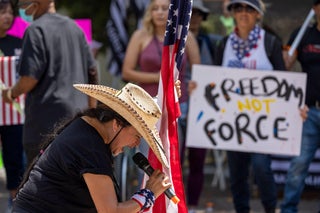

In May, Greg Locke, the right-wing evangelical head pastor of Tennessee’s Baptist Global Vision Bible Church, told a cheering congregation that “elites” were trying to push an unsafe vaccine on the public while injecting themselves with sugar water. “I know some of you, like, ‘My goodness! What am I gonna—my boss told me that if I don’t get the vaccination that I’m gonna lose my job,’” he said. “I can write you a religious exemption, and we will sue their stinkin’ pants off!” Locke is certainly not the only faith leader promoting anti-vax objections in the guise of religious concerns. A pastor in Riverside County, California, told his congregation in the spring that the vaccine was “unclean” and directed them to a downloadable form Christians could use to claim religious exemptions. Some Catholic clergy and groups have made such resources available, despite the pope’s very clear position on the matter; the Colorado Catholic Conference even published a template for Catholics seeking religious exemptions. Other churches have offered the same.
No major religions have expressed anything but support for the vaccine, but the rising number of vaccine mandates across the United States has spurred both the faithful and faith leaders to seek out and promote religious exemptions for the vaccine. While people like Locke make the concept sound simple, the reality is that there are no standard practices for determining or even allowing religious exemptions to vaccines. The idea of a religious exemption as a concept has a long and complicated history in the U.S., but it has rarely, and possibly never, come up against something as massive and urgent as the coronavirus pandemic. The reality is that religion is a powerful thing to wield, but it’s not necessarily a magic bullet.
AdvertisementSo when and where do exemptions work? The easiest answer is: wherever someone wants to offer one, given that it’s not clear anyone actually has to.
Advertisement Advertisement AdvertisementWhen businesses implement vaccine mandates for their employees, they are coming up with policies on the fly. Many add in language about a religious exemption on the advice of the U.S. Equal Employment Opportunity Commission, which has recommended that employers make reasonable efforts to accommodate employees with “sincerely held religious beliefs” to comply with Title VII of the Civil Rights Act. But even employers who don’t specify that there are religious exemptions may quickly cave when presented with a religious objection. Given the number of people raring to sue over the vaccine mandates, it wouldn’t be surprising if some businesses opted to offer exemptions to avoid getting lawyers involved.
AdvertisementIn the public sphere, things are similarly vague. Many states already have statutes guaranteeing religious exemptions for vaccines. When it came to mandates for public schools and government employees, the exemptions were often automatically built in. The U.S. military, which will begin requiring vaccines in the fall, has a formal process by which members request a religious exemption. The requirements can vary state by state, city by city, institution by institution. According to legal experts, it’s still an open question if anyone has to offer religious exemptions. While some argue that Title VII protections for employees include allowing religious exemptions for vaccines, others argue that an employer only has to accommodate an employee’s religious beliefs if they do not amount to an undue hardship—a caveat that could certainly be applied to the heightened risk of transmitting COVID. An employer may also choose to accommodate the employee by making them wear masks, social distance, take frequent COVID tests, and otherwise operate by different rules than vaccinated employees. And Dorit Rubinstein Reiss, a professor at the University of California, Hastings College of the Law, who studies vaccines and the law, said that she has seen more lawsuits directed against institutions that gave religious exemptions but denied specific individuals. It’s possible employers may be safer by giving no ground at all, she said.